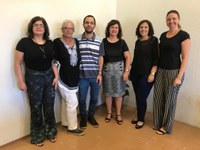CERSusChem is initiating a new project on education and knowledge dissemination
Sustainability should be a process that includes participation of the various segments of society in the decisions to be taken to improve the quality of life and the environment in the cities. In this way, promoting a reflexive attitude about the relations between society and nature and stimulating participation in solving environmental problems are fundamental requirements for the full exercise of citizenship.
The understanding and critical questioning of the relationships between water-energy-food allow to contemplate several objectives of Environmental Education recommended both in national and international documents and laws as well as in scientific studies in this area of knowledge, and that can be effectively achieved from an approach based on the Complexity Paradigm and the concepts of Collective Intelligence.
In this way, CERSusChem, in collaboration with the Laboratory of Studies on Complex Environmental Systems at the Department of Hydrobiology – UFSCar, is initiating a new project on education and knowledge dissemination. The general objective of this project is to develop an Environmental Education program focused on the local reality of the neighbourhoods in which public primary schools in the city of São Carlos are inserted, focussing on the links between water, energy and food. Specific objectives of the project are:
1) carry out participatory socio-environmental diagnosis of neighbourhoods around schools;
2) to carry out a diagnosis of concepts and practices in Environmental Education developed by public school teachers in São Carlos;
3) to involve UFSCar undergraduate and graduate students in the planning and execution of activities related to the project;
4) to promote the interaction of teachers and students of universities with the school communities and the neighbourhoods of their environments;
5) to encourage and advise teachers of the public school in the development of Environmental Education projects in their institutions, using the diagnoses and educational materials generated by the project.

